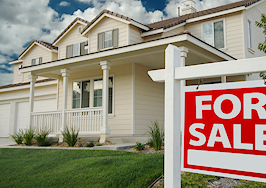Reposted with permission from www.mtgprofessor.com.
The homeownership rate has been increasing recently following more than 10 years of decline. According to the U.S. Census, the rate peaked in the first quarter of 2005 at 69.1 percent, then declined to a low of 62.9 percent in the second quarter of 2016. It has been creeping up since then, reaching 64.2 percent in the first quarter of this year.
This may or may not be a good thing, depending on how many of the new owners are “NOHOs” — my term for people who should not be homeowners.
Defining a ‘NOHO’
What makes NOHOs poor homeowners isn’t their income, family structure, mobility, ethnicity or where they live, but rather how they live.
Where successful homeowners live with at least one foot in the future and have learned how to delay some gratifications for future rewards, NOHOs live day to day — or week to week, or month to month, depending on how often they are paid. Whatever they want, they want it now.
Typically, they have nothing left at the end of their pay period, and if they run out early, they have to scrimp or borrow, usually at high interest rates.
When NOHOs make a costly purchase, such as a television set, they price it in terms of the monthly payment, which they attempt to fit into their weekly or monthly budget. They are easily seduced by offers of delayed payments and long repayment terms, ignoring the high prices that accompany such offers.
NOHOs sometimes write me about buying a house because they have heard that owning is cheaper than renting. They would buy a house in the same way they would buy a television set, by seeing if they can afford the monthly payment. In most cases, they have no savings but have heard that it is possible to get a loan for 100 percent of the sale price.
I try to discourage them by explaining the hidden costs and risks of homeownership and by pointing out that, as owners, they (not the landlord) are responsible for everything that goes wrong.
‘NOHO’ homeowners have trouble with property taxes
Any bump in the road is enough to throw homeowning NOHOs in the ditch. A common bump in the road is property taxes. One who wrote me had calculated her monthly obligation net of the tax deduction on the mortgage interest and fell behind on her payment because of something she did not anticipate — her tax savings did not become available to her until year end.
Another NOHO who wrote me was in serious trouble almost immediately because the property tax estimate by the lender turned out to be $200 a month too low. The NOHO said he would not have purchased the house had he known the correct figure. His house purchase plan had no margin for error.
More often, NOHOs can manage the tax when they move in, but they can’t manage a future tax increase. Of course, property taxes are known to rise (and if it doesn’t happen this year, then it’ll happen next year). It doesn’t take a lot of foresight to expect it, but foresight is in short supply among NOHOs.
Screening out ‘NOHO’ homebuyers: the down payment requirement
In the 1920s, NOHOs were all renters because mortgage lenders required house purchasers to put 40 percent down. Since NOHOs can’t save, they can’t make a down payment. The problem was that the high down payment requirement screened out many potential homeowners who were not NOHOS, especially first-time homebuyers (for whom our society seems to have a weak spot).
Over the years the screen has been much loosened.
On FHA-insured loans, the requirement declined from 20 percent in 1934 to 3.5 percent today. Loans purchased by Fannie Mae and Freddie Mac today require 5 percent down, though first-time buyers can qualify for 3 percent.
Veterans can obtain VA mortgages with no down payment, and the Department of Agriculture offers them to low-income purchasers in rural areas.
An alternative way of liberalizing the down payment screen is to allow the payment to come from someone other than the borrower. We have had a number of these, and some are more likely to allow NOHOs to avoid the screen than others.
Helping first-time buyers who aren’t ‘NOHOs’
Allowing a third party to make a down payment for a borrower in most cases is a better way to screen out NOHOs than a no down payment program that relies entirely on a credit evaluation. The third party is risking its contribution based on knowledge of the borrower. This is true of contributions made by family members, for whom assistance is a vote of confidence by those who usually know the borrower best.
To some degree, it is also true of investors who negotiate a share of future property appreciation. Several programs of this sort have arisen in recent years. It is not the case with homesellers, who can be depended upon to raise the house price by enough to cover their contribution.
The ‘NOHO’ cure
It isn’t easy but NOHOs can cure themselves by changing their lifestyle. The key is to reverse the practice of treating savings as a residual, or what is left at the end of the pay period after all expenses have been made.
The residual system doesn’t work for NOHOs because they never have anything left. A way to shift priorities is to make a deposit into a special savings account immediately after receiving income, so that spending is limited to what remains. It can work for those determined to make it work.
Jack M.Guttentag is Professor of Finance Emeritus at the Wharton School of the University of Pennsylvania and author of The Mortgage Encyclopedia.








